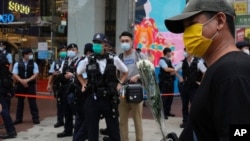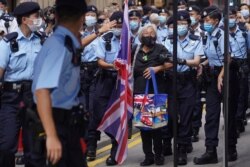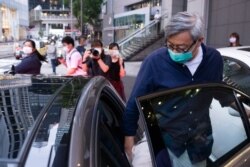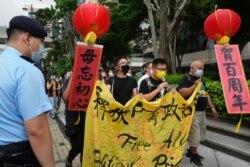As China exuberantly celebrated the 100-year anniversary of the Chinese Communist Party in Beijing, the mood and atmosphere for many in Hong Kong was different, as the territory marked the one-year anniversary of a controversial national security law critics say has significantly curtailed democratic freedoms.
Ted Hui, a former pro-democracy lawmaker who fled to Australia after facing nine charges in Hong Kong, told VOA the city is “unrecognizable.”
“In the past year I think the intensity is getting stronger and stronger and level of enforcement. It’s no doubt to me now, a year after the introduction of the NSL, 100% it is the death of ‘one country, two systems,’ a total collapse of Hong Kong’s freedoms. Not any autonomy at all,” he said.
Hui, was one of the 19 lawmakers who resigned from Hong Kong’s Legislative Council in November in protest of the government's decision to disqualify members of his party.
China enacted the security law in response to widespread protests in 2019 over the enactment of a controversial extradition bill. Major protests ensued for six months, often turning violent.
Among other things, the security legislation prohibits secession, subversion, terrorism, and collusion with foreign forces. At least 117 people have been arrested and 64 have been charged under the law, according to a Reuters report.
Eunice Yung, a pro-Beijing lawmaker, said she believes the law has “delivered immediate results” and was "very effective" in restoring stability.
“Hong Kong has emerged from chaos into stability, so there is no more violent acts now. Those activists endangering national security have either fled or they are being charged or have announced they are withdrawing from associations or groups, those who advocate for Hong Kong independence have subsided substantially," Yung told VOA.
However, Chow Hang-tung, vice-chair of the nonprofit Hong Kong Alliance, said the security law means Hong Kong is now governed under a “dictatorship,” making it a city “under fear.”
“Before, we feel we have freedom of expression, we still have our opposition, we still have people running for primaries, and planning on taking the Legislative Council,” she told VOA.
“I think they [now] want to target civil society organizations, NGO’s and all these political parties and groups. And it looks like ours,” she added.
Chow, who is also a lawyer, was arrested June 30, hours after speaking with VOA for allegedly inciting illegal assembly.
Holden Chow, a pro-Beijing lawmaker, insists the security law was vital to curtailing fear from the protests in 2019.
“People didn't have freedom to go out safely or point out the ugly truth and chaos done by protestors. People were beaten and even burnt only because they expressed views against the protestors,” Chow told VOA.
Jailed activists, press freedom
Following their involvement in the protests two years ago, several prominent activists have been jailed, including Joshua Wong, Agnes Chow and Lee Cheuk Yan.
The highest profile among them is media tycoon Jimmy Lai, 73, who has been an open critic of Beijing for years. Lai is currently serving jail time but is still facing life imprisonment for alleged foreign collusion under the security law.
Apple Daily, the pro-democracy newspaper Lai founded, was forced to close last month after authorities arrested five executives, also for alleged foreign collusion. Hong Kong’s Security Bureau froze the company’s financial access, leaving the paper unable to publish.
The newspaper's closure has brought new waves of concern to Hong Kong’s media industry. Stand News, a popular pro-democracy news website, has since decided to remove opinion reports and commentaries from its website out of concern about being targeted.
Andrew Powner managing partner at Haldanes, a Hong Kong law firm, told VOA that Article 4 of the security law guarantees press freedom, adding that the Apple Daily executive arrests have been deemed “exceptional cases” by government spokespersons.
The lawyer said, though, that until a written judgment from the Hong Kong courts explains its scope in relation to the offenses, the “red lines” are still unclear.
For the second time in two years, authorities denied pro-democracy groups permission to hold a rally to mark the anniversary of Hong Kong’s handover, citing gathering restrictions due to the COVID-19 pandemic.
However, just in case, a large police presence occupied the district Causeway Bay. Police stated 19 people were arrested during the day, including youth activist Wong Yat Chin, the convener of the pro-democracy political group StudentPoliticism.
Jonathan Fritz, U.S. Deputy Assistant Secretary of State, East Asian Pacific Affairs told reporters Thursday, “In spite of the ongoing, systematic crackdown, we are inspired to see the resilience of Hong Kongers in their pursuit of what the PRC promised them: a Hong Kong with a high degree of autonomy, universal suffrage and genuine protection of fundamental freedoms.
We hope Beijing will realize the truth: Hong Kongers aren’t the problem; they are its greatest strength. To dissent is to show your patriotism, and Hong Kongers are showing that they want their government to be better. If the PRC can have the confidence to tolerate dissent and welcome diverse points of view, Hong Kong will flourish.”







